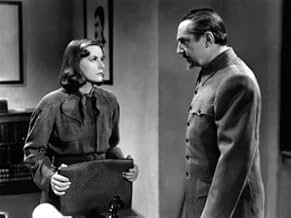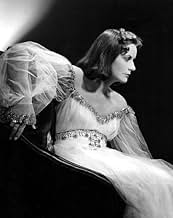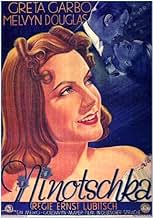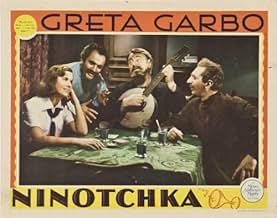IMDb-BEWERTUNG
7,8/10
24.037
IHRE BEWERTUNG
Eine strenge russische Frau auf offizieller Dienstreise in Paris fühlt sich zu einem Mann hingezogen, der alles repräsentiert, was sie verachten soll.Eine strenge russische Frau auf offizieller Dienstreise in Paris fühlt sich zu einem Mann hingezogen, der alles repräsentiert, was sie verachten soll.Eine strenge russische Frau auf offizieller Dienstreise in Paris fühlt sich zu einem Mann hingezogen, der alles repräsentiert, was sie verachten soll.
- Für 4 Oscars nominiert
- 5 Gewinne & 6 Nominierungen insgesamt
Dorothy Adams
- Swana's Maid
- (Nicht genannt)
Monya Andre
- Gossip
- (Nicht genannt)
Nino Bellini
- Swana's Restaurant Guest
- (Nicht genannt)
Wilda Bennett
- Swana's Restaurant Guest
- (Nicht genannt)
Eumenio Blanco
- Waiter
- (Nicht genannt)
Symona Boniface
- Gossip
- (Nicht genannt)
Tex Brodus
- Club Patron
- (Nicht genannt)
Empfohlene Bewertungen
Three comrades seek to sell expensive jewels, they'd been taken by the state, when it changed rules, now they're peddlers in Paris, pestered by a wealthy heiress, who's determined to get back, family heirloom. Ninotchka's sent to sort out all the mess, a stern and rigid woman in grey dress, but her fascia slowly falls, with the crumbling of her walls, as Leon opens doors, and gains access.
An absolutely delightful 1930s movie, sees Greta Garbo playing the hardnosed Ninotchka sent to resolve the mess created by three comical communist comrades, all brilliantly performed, while falling for the charms of Count Leon, a Paris playboy and a bit of a chancer.
An absolutely delightful 1930s movie, sees Greta Garbo playing the hardnosed Ninotchka sent to resolve the mess created by three comical communist comrades, all brilliantly performed, while falling for the charms of Count Leon, a Paris playboy and a bit of a chancer.
10rcohen-7
This is a fantastic movie. I can't understand why some people have problems with it. Makes me wonder if we don't have some people recoiling at some innocent cracks made at the Soviet Union's expense. As a romantic comedy it has very few peers and is a great introduction to black and white films for those used only to color. There are a plethora of interesting secondary characters. Garbo is wonderful, of course, and Dougless is as good as I've seen him any film. Lubitsch's direction is masterly, but not 'ground-breaking', a fault for which some are willing to run him under the harrow -- a case of holding someone to impossible standards. Nobody can break new ground in every film -- sometimes we have to settle for mere masterly competence. See this film! Unless you happen to romanticize the former Soviet Union, you will enjoy it.
Three Russian traders come to Paris to negotiate the jewels of a former Grand Duchess of the Russian empire. The former owner of the jewels, Grand Duchess Swana (Ina Claire), is exiled in Paris, and try to retrieve the possession through the French justice. Her lawyer and lover, Count Leon d'Algout (Melvyn Douglas), advises the Russians to wait for the sentence of the justice. Meanwhile, the Russian supervisor Nina Ivanovna Yakushova "Ninotchka" (Greta Garbo)" is sent to Paris to survey and evaluate the performance of the negotiators, and incidentally meets Count Leon d'Algout. They feel initially attracted for each other, and later they fall in love for each other. However, the Grand Suchess becomes jealous and their love become impossible due to the Russian closed political system. "Ninotchka" is a delightful romantic comedy and funny satire to the fight of classes. The chemistry between Melvyn Douglas, who has a magnificent performance, and Greta Garbo, gorgeous as usual, is amazing. The confrontation between the capitalism and socialism systems is exaggerated, labeled and caricatured, but very funny, provoking many laughs. My vote is nine.
Title (Brazil): "Ninotchka"
Title (Brazil): "Ninotchka"
An expertly-played and presented comedy that continues to be dogged by detractors for the oddest reasons. Some feel NINOTCHKA suffers compared to Lubitsch's earlier work, finding it formulaic alongside 1933's TROUBLE IN PARADISE. (I hadn't known Lubitsch had been given 'do-what-thou-wilt' privileges from the Hays Office - I'd labored under the delusion he faced the same restrictions in content and tone every other moviemaker did in 1939.) Other nay-sayers decry the film's jabs at Soviet collectivism as 'dated' if not 'unenlightened'. (Huh? You mean show trials and forced starvation of kulaks were GOOD things that a truly witty screenplay would celebrate?) Still other kibitzers squawk over the casting, of all things! (While it IS fun to picture William Powell or Robert Montgomery in the role of Leon, the boulevardier, Melvyn Douglas was never better than he is here. If he has his spotty moments, it's in those scenes where he must swoon with ardor, reciting dialogue that rings a tad purple to the ear; it's quite possible Powell or Montgomery would have fared even worse reading those lines.) Okay, enough defense - now let's go to NINOTCHKA's numerous strengths. Garbo is magnificent; she has a real knack for comedy (her deadpan entrance is hilarious) yet, as always, is able to break your heart with a look, a word, a gesture. Her three 'stooges' (Sig Rumann, Alexander Granach & Felix Bressart) are broadly funny and genuinely endearing. Ina Claire is everything her legend always claimed she was - though her character is icily calculating, you can't hate any woman who can make dialogue bristle like this. Lubitsch is in complete command throughout; his staging and pacing of the proceedings, masterful in its seeming effortlessness. Even the storied Metro glitz shines in NINOTCHKA, right down to the brilliant artifice of Cedric Gibbons' art direction (the Eiffel Tower sets especially). Last but not least is the superb screenplay by (among other hands) the team of Charles Brackett & Billy Wilder. Wisely, their satiric darts are dipped in a curare leavened by wit and sentiment, and while they are thrown with accuracy, their sting is never such that the satire sinks into the mire of political ideology. NINOTCHKA, after all, is about the triumph of love over politics, and to those who feel trapped in the prevailing toilet-ethic of the Farrelly Brothers' blood-poisoning of modern comedy, represents a much-needed antidote. Inoculate yourself at your earliest opportunity.
While it's a given that Greta Garbo was the most enigmatic of film stars during Hollywood's golden age, it's also fair to state that she may be the least relevant today for her austere beauty and cool, sometimes unapproachable demeanor. Yet, all that is erased with this 1939 comedy masterwork which brilliantly teams her with the master of innuendo-filled scintillation, Ernst Lubitsch. With a laser-sharp, witty script by Walter Reisch, Charles Brackett and Billy Wilder (before he became a master director himself), this classic is one part political comedy, one part screwball farce and one part romantic whimsy, all blended impeccably with the famous Lubitsch touch.
The plot involves Nina Ivanovna Yakushova, a Soviet envoy sent to Paris to ensure that the government receives the proceeds from the sale of jewels once owned and still coveted by the Grand Duchess Swana, now an expatriate. The cold, emotionless envoy goes about superseding the three lesser envoys who have been assimilating themselves into the frivolous, capitalistic world of Paris thanks to Count Leon, a tuxedoed dandy and the duchess's constant escort. It is Leon who dubs the envoy Ninotchka, and after initial resistance, the two find themselves falling in love but not at the expense of her convictions about the omnipotence of Communist values. The jewels become a negotiation ploy that complicates their affair as does the Grand Duchess herself. The plot develops in unexpected ways and through such clever observational humor that the ending comes all too soon.
While she is deified by many for the operatic tragedy of "Camille" and the mannered mystique of "Mata Hari", Garbo seems at first to be a parody of her sullen screen image with witty one-liners delivered in hilarious deadpan, but she, like her character, blossoms into a warm, comically romantic presence as the film progresses. It's a wondrous transformation and the one performance that assures Garbo her lasting stature more than any other. As Leon, Melvyn Douglas specialized in William Powell-knockoff roles like this one and while he does get a bit excessive in his 1930's-style romantic gestures, he is sophisticated and genial enough to have us believe Ninotchka may give up Mother Russia for him.
At first, stage legend Ina Claire seems like she will play the Grand Duchess Swana as a dotty ninny, but when her talons show, she is an excellent match for Garbo in their scenes together. As the trio of envoys ensconced in the good life, Sig Ruman, Felix Bressart and Alexander Granach make a merry chorus to the proceedings. I particularly like the scenes back in Russia when they share an omelet dinner with Ninotchka in her Soviet-sanctioned, multiple-occupant room. The print transfer on the 2005 DVD is pristine and brings out William Daniels' sparkling, black-and-white cinematography, though the only extra is the film's original trailer. This is truly a must-see.
The plot involves Nina Ivanovna Yakushova, a Soviet envoy sent to Paris to ensure that the government receives the proceeds from the sale of jewels once owned and still coveted by the Grand Duchess Swana, now an expatriate. The cold, emotionless envoy goes about superseding the three lesser envoys who have been assimilating themselves into the frivolous, capitalistic world of Paris thanks to Count Leon, a tuxedoed dandy and the duchess's constant escort. It is Leon who dubs the envoy Ninotchka, and after initial resistance, the two find themselves falling in love but not at the expense of her convictions about the omnipotence of Communist values. The jewels become a negotiation ploy that complicates their affair as does the Grand Duchess herself. The plot develops in unexpected ways and through such clever observational humor that the ending comes all too soon.
While she is deified by many for the operatic tragedy of "Camille" and the mannered mystique of "Mata Hari", Garbo seems at first to be a parody of her sullen screen image with witty one-liners delivered in hilarious deadpan, but she, like her character, blossoms into a warm, comically romantic presence as the film progresses. It's a wondrous transformation and the one performance that assures Garbo her lasting stature more than any other. As Leon, Melvyn Douglas specialized in William Powell-knockoff roles like this one and while he does get a bit excessive in his 1930's-style romantic gestures, he is sophisticated and genial enough to have us believe Ninotchka may give up Mother Russia for him.
At first, stage legend Ina Claire seems like she will play the Grand Duchess Swana as a dotty ninny, but when her talons show, she is an excellent match for Garbo in their scenes together. As the trio of envoys ensconced in the good life, Sig Ruman, Felix Bressart and Alexander Granach make a merry chorus to the proceedings. I particularly like the scenes back in Russia when they share an omelet dinner with Ninotchka in her Soviet-sanctioned, multiple-occupant room. The print transfer on the 2005 DVD is pristine and brings out William Daniels' sparkling, black-and-white cinematography, though the only extra is the film's original trailer. This is truly a must-see.
Wusstest du schon
- WissenswertesBela Lugosi received fourth billing even though he appears only near the end of the movie and only in one scene with Greta Garbo.
- PatzerWhen Ninotchka tells a funny story, objects on the desk change positions.
- Alternative VersionenAlso available in a computer colorized version.
- VerbindungenEdited into Hollywood: The Dream Factory (1972)
Top-Auswahl
Melde dich zum Bewerten an und greife auf die Watchlist für personalisierte Empfehlungen zu.
- How long is Ninotchka?Powered by Alexa
Details
- Erscheinungsdatum
- Herkunftsland
- Sprachen
- Auch bekannt als
- Ninotchka
- Drehorte
- Produktionsfirma
- Weitere beteiligte Unternehmen bei IMDbPro anzeigen
Box Office
- Budget
- 1.365.000 $ (geschätzt)
- Weltweiter Bruttoertrag
- 2.477 $
- Laufzeit1 Stunde 50 Minuten
- Farbe
- Seitenverhältnis
- 1.37 : 1
Zu dieser Seite beitragen
Bearbeitung vorschlagen oder fehlenden Inhalt hinzufügen






































